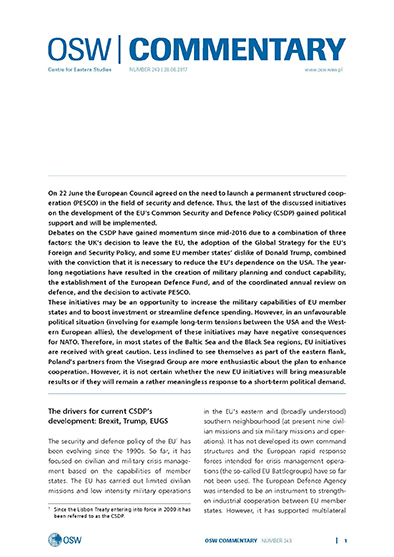Helpless and lonely: Turkey’s attitude towards the war in Syria
Helpless and lonely: Turkey’s attitude towards the war in Syria
Author(s): Szymon Ananicz
Subject(s): Security and defense, Military policy, Geopolitics, Peace and Conflict Studies
Published by: OSW Ośrodek Studiów Wschodnich im. Marka Karpia
Keywords: Turkey; Syria; war; conflict
Summary/Abstract: The conflict in Syria, which has lasted since 2011, has become the most significant test of the efficiency of Turkey’s foreign policy and the biggest challenge to Turkey’s security in recent decades. The lack of a clear prospect of an end to the war does not allow us to come to a final conclusion regarding the Syrian civil war’s importance for Turkey. However, it can be said today that with the exception of the initial phase of the conflict, Ankara’s influence over the course of events in Syria has been limited, and the war itself is evolving in a direction that is unfavourable for Turkey: the hostile regime of Bashar al-Assad is still in power, the opposition has proved to be an unreliable or even a dangerous ally, and in northern Syria militant jihadist groups and Kurds are gaining importance. It is also quite unlikely that the West will take any greater responsibility for stabilising the situation in the region.In response to such an unfortunate situation, and out of fear of risking deeper involvement in the conflict, during the past year Turkey’s policy towards Syria has been restrained, reactive and focused mainly on defending Turkey’s territory. However, this policy offers no security guarantees and does not prevent the country’s regional position from weakening, especially in the context of the reinforcement of the jihadist militants and the Kurdish autonomy in northern Syria.The arguments for Turkey continuing its defensive policy are strong: the country fears the possible results of an open confrontation with Assad’s forces; most probably it could not count on support for such actions from within its own society or its Western allies. It also does not have enough acceptance within the anti-Assad opposition circles. On the other hand, though, the risk of uncontrolled development of events is still present; the risk of confrontations with armed jihadist militants is growing; and the potential operation of Turkish forces, either against the jihadists or against Assad’s army, could be considered as a method of diverting attention from the political problems with which the AKP government has been struggling at home.
Series: OSW Commentary
- Page Count: 7
- Publication Year: 2014
- Language: English
- Content File-PDF

